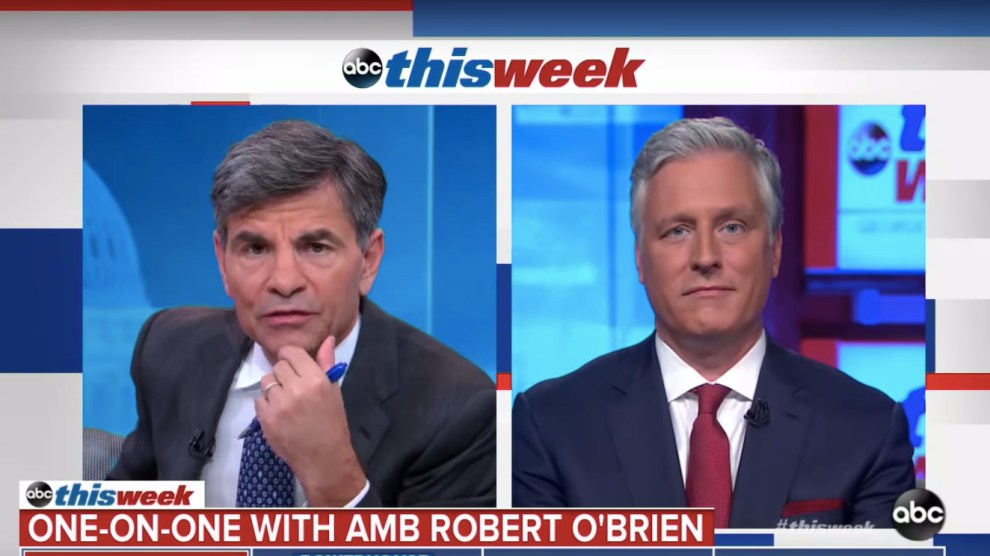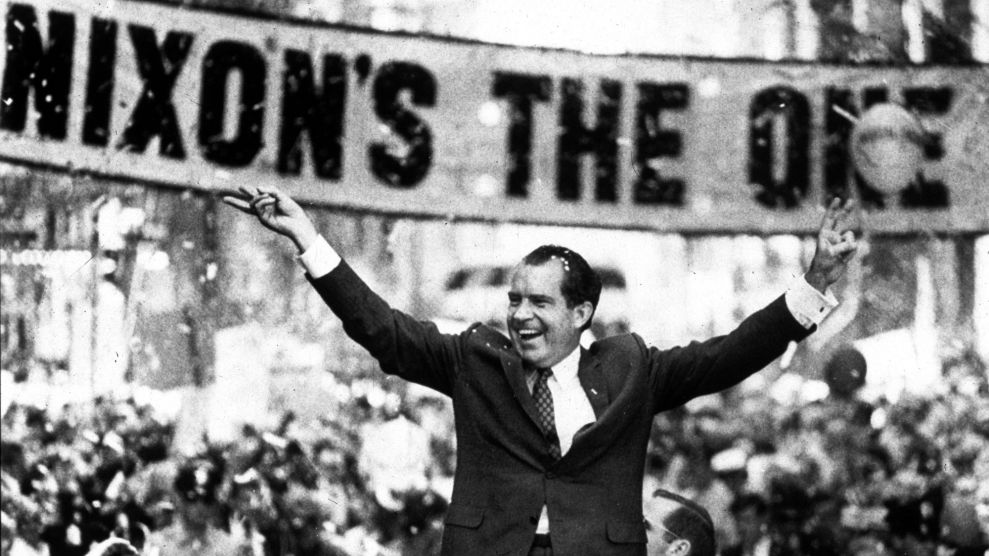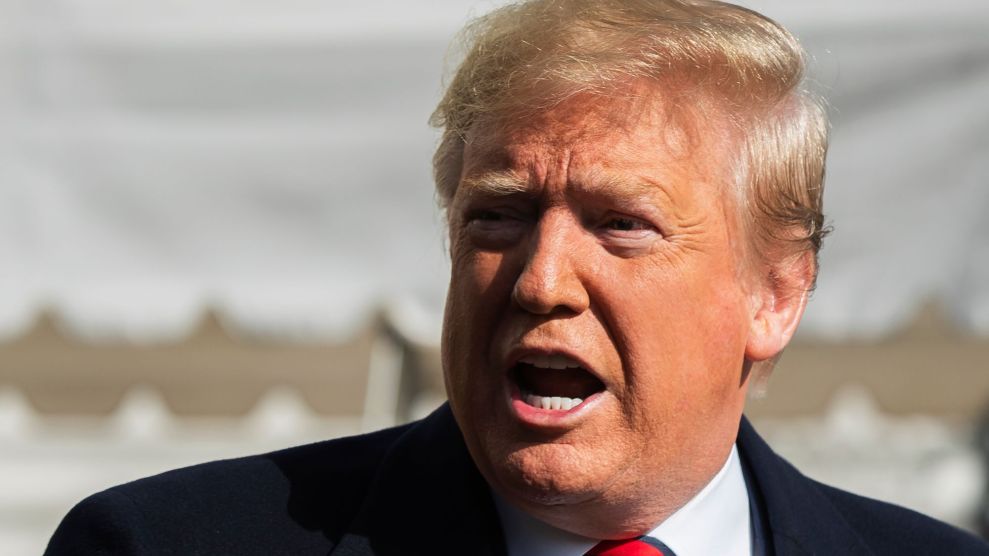
George Stephanopoulos interviews Trump national security adviser Robert C. O'Brien.ABC News/YouTube
Every once in a while, a moment comes that crystallizes what is so wrong with the political-media universe in the era of Donald Trump. And one such moment occurred on Sunday morning. It was not flashy or headline-generating. This moment lasted only seconds. Its significance may not have even been noticed by the participants or those who witnessed it. But it deserves attention for showing how Trump and his crew have been able to get away with brazen lying and acts of treachery—and how Trumpian dishonesty has been normalized or, at least, tacitly accepted.
The moment occurred where so many important Washington actions transpire: on one of the Sunday morning news shows. Midway into ABC News’ This Week, longtime host George Stephanopoulos welcomed Robert O’Brien, Trump’s low-profile national security adviser, to the broadcast. Not surprisingly, O’Brien defended Trump’s lethal military strike against Qassem Soleimani, the Iranian general, and hailed Trump’s policy regarding Iran. When Stephanopoulos pressed him on Trump’s assertion that Soleimani was about to launch attacks against four US embassies before he was killed—which some commentators have argued was a false statement—O’Brien sidestepped the question: “Well, I think the American people are behind this president. He’s shown incredible restraint in the face of provocation after provocation from Iran…So he’s shown he’s—he’s modest in his—his dealings with other countries. But when you threaten to kill or to maim Americans, that’s something this president won’t put up with.” He then insisted, “We had very good intelligence.” O’Brien noted he would “love” to release it, but he maintained the administration could not make public the information without threatening the flow of similar intelligence.
All of this was the average Washington spin that commonly appears on such shows: The policy was great, we did the right thing, the critics are wrong, and so on. Next, Stephanopoulos turned to a recent Bloomberg article that reported US intelligence and law enforcement officials have been examining whether Russia has been mounting a disinformation campaign to undermine Joe Biden’s presidential bid. He asked O’Brien, “Has the president told Vladimir Putin to cut out this election interference in 2016, and will he continue to do that even if it appears the Russians are trying to hurt Joe Biden?”
Here’s where O’Brien moved from the zone of spin to pitching an Orwellian anti-reality. He replied, “He’s absolutely told Putin to make sure that that doesn’t happen. And the idea that the president of the United States would collude with the Russians—I mean, this is a partisan fantasy that’s been—the flames which have been fanned for three years now. There’s zero truth to it.”
Let’s break this down. There is no evidence that Trump has sent Putin a clear message: Don’t intervene in the next US election. His last call with Putin occurred in late December, and the White House readout of the call contained no reference to any such warning. Moreover, Trump has repeatedly expressed doubt about the US intelligence community’s conclusion that Russia attacked the 2016 election, most famously when he was standing next to Putin at a joint press conference in Helsinki in July 2018. In doing so, he has provided cover for Putin. Moreover, the Washington Post reported in September that Trump had told two senior Russian officials, during an Oval Office meeting in May 2017, that he was not concerned about the Russian assault on the 2016 election. (That hardly sounds like a warning.) And the New York Times reported last year that senior government officials could not bring up the issue of Moscow interference with Trump because he believed any discussion of the matter cast doubt on the legitimacy of his electoral victory.
O’Brien was portraying Trump as a normal president handling a national security threat as any president ought to do. But his meant-to-be-reassuring assertion that Trump has confronted Putin on this critical matter is contradicted by the public record. In fact, there have been no signs that Trump, who won’t fully acknowledge Putin’s 2016 attack, gives a damn about thwarting further Russian interference in US politics. Yet Stephanopoulos did not challenge O’Brien on this point. And you will note that O’Brien quickly tried to change the subject to the topic of collusion. Special counsel Robert Mueller did report that his investigation did not uncover evidence of a direct criminal conspiracy between Trump and the Russians in 2016. But the record is clear: Trump encouraged and exploited the attack, helped Putin cover it up, and, as president, has essentially ignored this assault on the United States. The image of Trump that O’Brien was presenting to millions of viewers was the precise opposite of the truth.
Stephanopoulos did not interrupt O’Brien, and Trump’s chief national security aide continued: “There are a bunch of countries that would like to interfere with our elections. There are the Chinese, the Iranians, the Russians. And trust me, most of them would like to see President Trump leave and have a more malleable leader coming after him, where they could go back to the—the status quo before the president came in.”
Wait a minute. The Russians attacked the US election in 2016 in part to help Trump. They wanted him—not Hillary Clinton—in the White House. Who says so? The US intelligence community, Mueller’s investigation, and the GOP-led Senate Intelligence Committee. O’Brien was not only conveniently ignoring this basic point. He was turning it upside down. Once again, he had moved from the boundaries of the usual spin to outright black-is-white falsification.
Without slowing down, O’Brien slid into this whopper: “Look, I don’t want Russians, or Chinese, or Iranians, or any others interfering with the Trump campaign, with the Biden campaign, with any campaign. And I think the president feels absolutely the same way.” Trump doesn’t want foreign powers influencing the election? Uh, no. That ain’t so. We know this because Trump has said so himself. In public. Three months ago, Trump called on China to investigate Joe Biden. And he said the same regarding Ukraine. (During a 2016 campaign press conference, Trump urged Russian hackers to target Clinton—and, according to Mueller, the Russians immediately tried to do what Trump requested.) Moreover, Trump last summer said that he would accept dirt on a political opponent from a foreign government—and he said that during an interview with Stephanopoulos.
So O’Brien was being extremely disingenuous. Trump has demonstrated he would indeed like to see China and Ukraine take steps to undermine a potential rival of his. He has made it clear to every foreign government in the world that he would be delighted to accept any negative information they might want to share on whoever runs against him. Yet the O’Brien interview did not come to a screeching halt. Instead, O’Brien used this platform to turn the question of Trump’s solicitation of foreign interference on its head: “And to suggest [Trump would welcome foreign involvement] is unfair and frankly a bit dangerous. That’s the sort of thing that I think the Russians try to foment, you know, and others, is divisions in America. We need to stand together and put—put that sort of language aside for sure.” That is, to note that Trump has asked other countries to meddle in the election would, in and of itself, be dangerous for American democracy and helpful to Moscow. This was crazy.
Stephanopoulos did not tell his audience that O’Brien was massacring the truth. But he served up a slice of push-back, referencing Trump’s nutty and unfounded claim that Ukraine (not Russia) was involved in the hacking of the Democratic Party’s computer servers in 2016. He asked O’Brien, “If the president is repeating conspiracy theories that are consistent with Russian propaganda, isn’t that helping the Russian effort?” O’Brien shot back: “I don’t see that. We’ve been very clear on our position with respect to the Russians and that’s to stay out of our elections. We’ve been very clear with the Chinese, and we’ve been very clear with the Iranians…But trying to use these things for some partisan—sort of partisan advantage is really disappointing.” (Once again, Trump directly asked China to become involved in the 2020 race.) And that was it. Stephanopoulos concluded the interview with, “Mr. O’Brien, thanks for your time this morning,”
My aim here is not to pick on Stephanopoulos. In June, he aired a devastating interview with Trump. He is not the bad-faith actor in this scene. The problem here is both the format of the exchange and its sociology. O’Brien was lying his head off—and he was doing so to cover for his boss’s own lies and misdeeds. It is undeniable that Trump has signal-boosted Moscow’s we-didn’t-do-it disinformation about the 2016 attack and has called on other foreign powers to mess with the 2020 election. These are actions that subvert American democracy—arguably profound acts of betrayal. They are Trump’s most consequential wrongdoing because they corrupt the most fundamental element of the US political system. Yet the political-media world—too often organized on the idea that there is a clash of competing narratives that deserve equal attention—has not elevated these Trump transgressions to a primary spot in the national conversation. Instead, they are frequently depicted as contentions that exist within a huge roiling ocean of other contentions. Stephanopoulos—faced with the demands of covering the week’s news and of keeping the interview to the allotted time slot—was not going to suddenly change all that Sunday morning.
Consequently, when O’Brien misleads the public on all this, it’s just another Sunday. Nothing special. Stephanopoulos doesn’t read him the riot act. And there are no subsequent, front-page headlines: “Trump’s National Security Adviser Misleads Public About President’s Role in Russia Scandal,” or “Top Trump Aide Falsely Claims Trump Hasn’t Asked Foreign Governments to Intervene in 2020.” This is not how the machine operates. There is a baseline courtesy built into these interactions. And that favors someone who is willing to pervert the truth. He or she can take advantage of a culture in which it is not possible or not polite to call out every single prevarication. So O’Brien can spout several highly significant lies or misstatements in a short spate of time, and there is no gong. No buzzer goes off. He comes across as a reasonable advocate for his side and the president, even if he is covering up profound misconduct. In other words, he gets away with it. Maybe a fact checker at a news outlet or website will later take a poke at him. But those darts don’t seem to sting too much these days.
There are instances when such a culprit does get hammered. In early December, Chuck Todd on Meet the Press took Sen. John Kennedy (R-La.) to task for mouthing Trump’s nutty conspiracy theory about Ukrainian election interference in 2016. And soon after, Todd noted in a Rolling Stone interview that he had been “naive” to underestimate the extent to which Trump and his Republican defenders would resort to false statements and disinformation.
But the question is, what to do about this disinformation—especially when conventional media, reflecting the values of conventional Washington, has long advanced the notion that both sides (meaning the Ds and the Rs) deserve a hearing. And also especially when the notions of fairness, evenhandedness, and objectivity ingrained within major media organizations cause them to serve as an outlet for each of those sides. O’Brien, the guy in charge of coordinating national security policy for the most powerful man in world, was openly pushing serious disinformation about a most serious matter on This Week. What’s the appropriate reaction to that? Shut him down on live television? Refuse to have him back? Should think tanks not invite him to events and discussions? After he leaves office, should he be shunned?
This is a minor episode, but it does raise large questions. It illuminates how Trump and his posse have often been able to escape major consequences for their cynical use of disinformation. The system is not designed to weed out serial deceivers who hold positions of power and influence—or to consistently sound the alarm on disinformation. That is particularly so when it faces a pattern similar to what experts have called the Russian model of propaganda: “the firehose of falsehoods.” O’Brien was given the opportunity to spray fast and furiously on Sunday morning; the truth got washed away. And that’s the point. Mission accomplished.

















